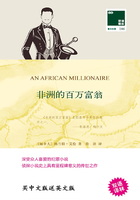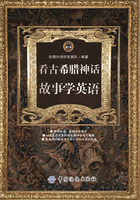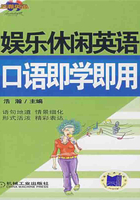"Is it very ugly?" continued Mrs. Palmer. "Then it must be some other place that is so pretty I suppose."
When they were seated in the dining-room, Sir John observed with regret that they were only eight altogether.
"My dear," said he to his lady, "it is very provoking that we should be so few. Why did not you ask the Gilberts to come to us to-day?"
"Did not I tell you, Sir John, when you spoke to me about it before,that it could not be done? They dined with us last."
"You and I, Sir John," said Mrs. Jennings, "should not stand upon such ceremony."
"Then you would be very ill-bred, " cried Mr. Palmer.
"My love, you contradict everybody," said his wife with her usual laugh. "Do you know that you are quite rude?"
"I did not know I contradicted anybody in calling your mother ill-bred."
"Aye, you may abuse me as you please," said the good-natured old lady; "you have taken Charlotte off my hands and cannot give her back again. So there I have the whip hand of you."
Charlotte laughed heartily to think that her husband could not get rid of her; and exultingly said she did not care how cross he was to her, as they must live together. It was impossible for anyone to be more thoroughly good-natured, or more determined to be happy than Mrs. Palmer. The studied indifference, insolence, and discontent of her husband gave her no pain; and when he scolded or abused her, she was highly diverted.
"Mr. Palmer is so droll!" said she in a whisper to Elinor. "He is always out of humour."
Elinor was not inclined, after a little observation, to give him credit for being so genuinely and unaffectedly ill-natured or ill-bred as he wished to appear. His temper might perhaps be a little soured by finding, like many others of his sex, that through some unaccountable bias in favour of beauty, he was the husband of a very silly woman; but she knew that this kind of blunder was too common for any sensible man to be lastingly hurt by it. It was rather a wish of distinction, she believed, which produced his contemptuous treatment of everybody and his general abuse of everything before him. It was the desire of appearing superior to other people. The motive was too common to be wondered at; but the means, however they might succeed by establishing his superiority in ill-breeding, were not likely to attach anyone to him except his wife.
"Oh! my dear Miss Dashwood," said Mrs. Palmer soon afterwards, "I have got such a favour to ask of you and your sister. Will you come and spend some time at Cleveland this Christmas? Now, pray do; and come while the Westons are with us. You cannot think how happy I shall be! It will be quite delightful! —My love," applying to her husband, "don't you long to have the Miss Dashwoods come to Cleveland?"
"Certainly," he replied with a sneer, "I came into Devonshire with no other view."
"There now," said his lady, "you see Mr. Palmer expects you; so you cannot refuse to come."
They both eagerly and resolutely declined her invitation.
"But indeed you must and shall come. I am sure you will like it of all things. The Westons will be with us, and it will be quite delightful. You cannot think what a sweet place Cleveland is; and we are so gay now, for Mr. Palmer is always going about the country canvassing against the election; and so many people come to dine with us that I never saw before; it is quite charming! But, poor fellow! It is very fatiguing to him! For he is forced to make everybody like him."
Elinor could hardly keep her countenance as she assented to the hardship of such an obligation.
"How charming it will be," said Charlotte, "when he is in Parliament! Won't it? How I shall laugh! It will be so ridiculous to see all his letters directed to him with an M. P. But do you know, he says, he will never frank for me? He declares he won't. Don't you, Mr. Palmer?"
Mr. Palmer took no notice of her.
"He cannot bear writing, you know," she continued. "He says it is quite shocking."
"No," said he, "I never said anything so irrational. Don't palm all your abuses of language upon me."
"There now, you see how droll he is. This is always the way with him! Sometimes he won't speak to me for half a day together, and then he comes out with something so droll—all about anything in the world."
She surprised Elinor very much as they returned into the drawing-room by asking her whether she did not like Mr. Palmer excessively.
"Certainly," said Elinor, "he seems very agreeable."
"Well, I am so glad you do. I thought you would; he is so pleasant;and Mr. Palmer is excessively pleased with you and your sisters, I can tell you; and you can't think how disappointed he will be if you don't come to Cleveland. I can't imagine why you should object to it."
Elinor was again obliged to decline her invitation; and by changing the subject, put a stop to her entreaties. She thought it probable that as they lived in the same county, Mrs. Palmer might be able to give some more particular account of Willoughby's general character than could be gathered from the Middletons' partial acquaintance with him; and she was eager to gain from anyone such a confirmation of his merits as might remove the possibility of fear for Marianne. She began by inquiring if they saw much of Mr. Willoughby at Cleveland and whether they were intimately acquainted with him.
"Oh! dear, yes; I know him extremely well," replied Mrs. Palmer."Not that I ever spoke to him indeed, but I have seen him forever in town. Somehow or other I never happened to be staying at Barton while he was at Allenham. Mama saw him here once before, but I was with my uncle at Weymouth. However, I dare say we should have seen a great deal of him in Somersetshire if it had not happened very unluckily that we should never have been in the country together. He is very little at Combe, I believe; but if he were ever so much there, I do not think Mr. Palmer would visit him, for he is in the opposition you know, and besides it is such a way off. I know why you inquire about him very well; your sister is to marry him. I am monstrous glad of it, for then I shall have her for a neighbour you know."
"Upon my word," replied Elinor, "you know much more of the matter than I do if you have any reason to expect such a match."
"Don't pretend to deny it, because you know it is what everybody talks of. I assure you I heard of it in my way through town."
"My dear Mrs. Palmer!"
"Upon my honour I did. I met Colonel Brandon Monday morning in Bond Street just before we left town, and he told me of it directly."
"You surprise me very much. Colonel Brandon tell you of it! Surely you must be mistaken. To give such intelligence to a person who could not be interested in it, even if it were true, is not what I should expect Colonel Brandon to do."
"But I do assure you it was so, for all that, and I will tell you how it happened. When we met him, he turned back and walked with us; and so we began talking of my brother and sister, and one thing and another, and I said to him, 'So, Colonel, there is a new family come to Barton cottage, I hear, and mama sends me word they are very pretty, and that one of them is going to be married to Mr. Willoughby of Combe Magna. Is it true, pray? For of course you must know, as you have been in Devonshire so lately.' "
"And what did the Colonel say?"
"Oh! he did not say much; but he looked as if he knew it to be true, so from that moment I set it down as certain. It will be quite delightful, I declare! When is it to take place?"
"Mr. Brandon was very well I hope."
"Oh! yes, quite well; and so full of your praises, he did nothing but say fine things of you."
"I am flattered by his commendation. He seems an excellent man,and I think him uncommonly pleasing."
"So do I. He is such a charming man that it is quite a pity he should be so grave and so dull.Mama says he was in love with your sister too. I assure you it was a great compliment if he was, for he hardly ever falls in love with anybody."
"Is Mr. Willoughby much known in your part of Somersetshire?"said Elinor.
"Oh! yes, extremely well; that is, I do not believe many people are acquainted with him because Combe Magna is so far off; but they all think him extremely agreeable I assure you. Nobody is more liked than Mr. Willoughby wherever he goes, and so you may tell your sister. She is a monstrous lucky girl to get him, upon my honour; not but that he is much more lucky in getting her, because she is so very handsome and agreeable that nothing can be good enough for her. However I don't think her hardly at all handsomer than you, I assure you; for I think you both excessively pretty, and so does Mr. Palmer too I am sure, though we could not get him to own it last night."
Mrs. Palmer's information respecting Willoughby was not very material; but any testimony in his favour, however small, was pleasing to her.
"I am so glad we are got acquainted at last," continued Charlotte."And now I hope we shall always be great friends. You can't think how much I longed to see you! It is so delightful that you should live at the cottage! Nothing can be like it to be sure! And I am so glad your sister is going to be well-married! I hope you will be a great deal at Combe Magna. It is a sweet place by all accounts."
"You have been long acquainted with Colonel Brandon, have not you?"
"Yes, a great while; ever since my sister married. He was a particular friend of Sir John's. I believe," she added in a low voice, "he would have been very glad to have had me if he could. Sir John and Lady Middleton wished it very much. But mama did not think the match good enough for me; otherwise Sir John would have mentioned it to the Colonel, and we should have been married immediately."
"Did not Colonel Brandon know of Sir John's proposal to your mother before it was made? Had he never owned his affection to yourself?"
"Oh! no; but if mama had not objected to it, I dare say he would have liked it of all things. He had not seen me then above twice, for it was before I left school. However, I am much happier as I am. Mr. Palmer is just the kind of man I like."
Chapter 21
THE PALMERS RETURNED to Cleveland the next day, and the two families at Barton were again left to entertain each other. But this did not last long; Elinor had hardly got their last visitors out of her head, had hardly done wondering at Charlotte's being so happy without a cause, at Mr. Palmer's acting so simply with good abilities, and at the strange unsuitableness which often existed between husband and wife, before Sir John's and Mrs. Jennings's active zeal in the cause of society procured her some other new acquaintance to see and observe.
In a morning's excursion to Exeter they had met with two young ladies, whom Mrs. Jennings had the satisfaction of discovering to be her relations, and this was enough for Sir John to invite them directly to the park, as soon as their present engagements at Exeter were over. Their engagements at Exeter instantly gave way before such an invitation, and Lady Middleton was thrown into no little alarm on the return of Sir John by hearing that she was very soon to receive a visit from two girls whom she had never seen in her life, and of whose elegance, whose tolerable gentility even, she could have no proof; for the assurances of her husband and mother on that subject went for nothing at all. Their being her relations too made it so much the worse; and Mrs. Jennings's attempts at consolation were therefore unfortunately founded when she advised her daughter not to care about their being so fashionable because they were all cousins and must put up with one another. As it was impossible, however, now to prevent their coming, Lady Middleton resigned herself to the idea of it with all the philosophy of a well-bred woman, contenting herself with merely giving her husband a gentle reprimand on the subject five or six times every day.
The young ladies arrived; their appearance was by no means ungenteel or unfashionable. Their dress was very smart, their manners very civil, they were delighted with the house and in raptures with the furniture, and they happened to be so dotingly fond of children that Lady Middleton's good opinion was engaged in their favour before they had been an hour at the park. She declared them to be very agreeable girls indeed, which for her ladyship was enthusiastic admiration. Sir John's confidence in his own judgment rose with this animated praise, and he set off directly for the cottage to tell the Miss Dashwoods of the Miss Steeles' arrival and to assure them of their being the sweetest girls in the world. From such commendation as this, however, there was not much to be learned; Elinor well knew that the sweetest girls in the world were to be met with in every part of England, under every possible variation of form, face, temper, and understanding. Sir John wanted the whole family to walk to the park directly and look at his guests. Benevolent, philanthropic man! It was painful to him even to keep a third cousin to himself.
"Do come now," said he. "Pray come—You must come—I declare you shall come—You can't think how you will like them. Lucy is monstrous pretty and so good-humoured and agreeable! The children are all hanging about her already as if she was an old acquaintance. And they both long to see you of all things, for they have heard at Exeter that you are the most beautiful creatures in the world; and I have told them it is all very true, and a great deal more. You will be delighted with them I am sure. They have brought the whole coach full of playthings for the children. How can you be so cross as not to come? Why they are your cousins,you know,after a fashion.You are my cousins,and they are my wife's; so you must be related."
But Sir John could not prevail. He could only obtain a promise of their calling at the park within a day or two, and then left them in amazement at their indifference, to walk home and boast anew of their attractions to the Miss Steeles, as he had been already boasting of the Miss Steeles to them.
When their promised visit to the park and consequent introduction to these young ladies took place, they found in the appearance of the eldest, who was nearly thirty, with a very plain and not a sensible face, nothing to admire; but in the other, who was not more than two or three and twenty, they acknowledged considerable beauty; her features were pretty, and she had a sharp quick eye and a smartness of air, which though it did not give actual elegance or grace, gave distinction to her person. Their manners were particularly civil, and Elinor soon allowed them credit for some kind of sense when she saw with what constant and judicious attentions they were making themselves agreeable to Lady Middleton. With her children they were in continual raptures, extolling their beauty, courting their notice, and humouring all their whims; and such of their time as could be spared from the importunate demands which this politeness made on it was spent in admiration of whatever her ladyship was doing, if she happened to be doing anything, or in taking patterns of some elegant new dress in which her appearance the day before had thrown them into unceasing delight. Fortunately for those who pay their court through such foibles, a fond mother, though in pursuit of praise for her children, the most rapacious of human beings, is likewise the most credulous; her demands are exorbitant; but she will swallow anything;and the excessive affection and endurance of the Miss Steeles towards her offspring were viewed therefore by Lady Middleton without the smallest surprise or distrust. She saw with maternal complacency all the impertinent incroachments and mischievous tricks to which her cousins submitted. She saw their sashes untied, their hair pulled about their ears, their work-bags searched, and their knives and scissors stolen away, and felt no doubt of its being a reciprocal enjoyment. It suggested no other surprise than that Elinor and Marianne should sit so composedly by, without claiming a share in what was passing.
"John is in such spirits to-day!" said she, on his taking Miss Steele's pocket handkerchief and throwing it out of window. "He is full of monkey tricks."
And soon afterwards, on the second boy's violently pinching one of the same lady's fingers, she fondly observed, "How playful William is!"
"And here is my sweet little Annamaria," she added, tenderly caressing a little girl of three years old, who had not made a noise for the last two minutes; "And she is always so gentle and quiet. Never was there such a quiet little thing!"
But unfortunately in bestowing these embraces, a pin in her ladyship's head-dress, slightly scratching the child's neck, produced from this pattern of gentleness such violent screams as could hardly be outdone by any creature professedly noisy. The mother's consternation was excessive; but it could not surpass the alarm of the Miss Steeles, and everything was done by all three, in so critical an emergency, which affection could suggest as likely to assuage the agonies of the little sufferer. She was seated in her mother's lap, covered with kisses, her wound bathed with lavender-water, by one of the Miss Steeles, who was on her knees to attend her, and her mouth stuffed with sugar plums by the other. With such a reward for her tears, the child was too wise to cease crying. She still screamed and sobbed lustily, kicked her two brothers for offering to touch her, and all their united soothings were ineffectual till Lady Middleton luckily remembering that in a scene of similar distress last week some apricot marmalade had been successfully applied for a bruised temple, the same remedy was eagerly proposed for this unfortunate scratch, and a slight intermission of screams in the young lady on hearing it gave them reason to hope that it would not be rejected. She was carried out of the room therefore in her mother's arms in quest of this medicine, and as the two boys chose to follow, though earnestly entreated by their mother to stay behind, the four young ladies were left in a quietness which the room had not known for many hours.
"Poor little creature!" said Miss Steele as soon as they were gone. "It might have been a very sad accident."
"Yet I hardly know how," cried Marianne, "unless it had been under totally different circumstances. But this is the usual way of heightening alarm, where there is nothing to be alarmed at in reality."
"What a sweet woman Lady Middleton is!" said Lucy Steele.
Marianne was silent; it was impossible for her to say what she did not feel, however trivial the occasion; and upon Elinor, therefore, the whole task of telling lies when politeness required it always fell. She did her best when thus called on by speaking of Lady Middleton with more warmth than she felt, though with far less than Miss Lucy.
"And Sir John too," cried the elder sister, "what a charming man he is!"
Here too Miss Dashwood's commendation, being only simple and just, came in without any éclat. She merely observed that he was perfectly good-humoured and friendly.
"And what a charming little family they have! I never saw such fine children in my life. I declare I quite dote upon them already, and indeed I am always distractedly fond of children."
"I should guess so," said Elinor with a smile, "from what I have witnessed this morning."
"I have a notion," said Lucy, "you think the little Middletons rather too much indulged; perhaps they may be the outside of enough; but it is so natural in Lady Middleton; and for my part, I love to see children full of life and spirits; I cannot bear them if they are tame and quiet."
"I confess," replied Elinor, "that while I am at Barton Park, I never think of tame and quiet children with any abhorrence."
A short pause succeeded this speech, which was first broken by Miss Steele, who seemed very much disposed for conversation, and who now said rather abruptly, "And how do you like Devonshire, Miss Dashwood? I suppose you were very sorry to leave Sussex."
In some surprise at the familiarity of this question, or at least of the manner in which it was spoken, Elinor replied that she was.
"Norland is a prodigious beautiful place, is not it?" added Miss Steele.
"We have heard Sir John admire it excessively," said Lucy, who seemed to think some apology necessary for the freedom of her sister.
"I think everyone must admire it,"replied Elinor,"who ever saw the place; though it is not to be supposed that anyone can estimate its beauties as we do."
"And had you a great many smart beaux there? I suppose you have not so many in this part of the world; for my part, I think they are a vast addition always."
"But why should you think," said Lucy, looking ashamed of her sister, "that there are not as many genteel young men in Devonshire as Sussex?"















